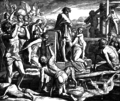The Cities Portal

A city is a human settlement of a notable size. The term "city" has different meanings around the world and in some places the settlement can be very small. Even where the term is limited to larger settlements, there is no universally agreed definition of the lower boundary for their size. In a more narrow sense, a city can be defined as a permanent and densely settled place with administratively defined boundaries whose members work primarily on non-agricultural tasks. Cities generally have extensive systems for housing, transportation, sanitation, utilities, land use, production of goods, and communication. Their density facilitates interaction between people, government organizations, and businesses, sometimes benefiting different parties in the process, such as improving the efficiency of goods and service distribution.
Historically, city dwellers have been a small proportion of humanity overall, but following two centuries of unprecedented and rapid urbanization, more than half of the world population now lives in cities, which has had profound consequences for global sustainability. Present-day cities usually form the core of larger metropolitan areas and urban areas—creating numerous commuters traveling toward city centres for employment, entertainment, and education. However, in a world of intensifying globalization, all cities are to varying degrees also connected globally beyond these regions. This increased influence means that cities also have significant influences on global issues, such as sustainable development, climate change, and global health. Because of these major influences on global issues, the international community has prioritized investment in sustainable cities through Sustainable Development Goal 11. Due to the efficiency of transportation and the smaller land consumption, dense cities hold the potential to have a smaller ecological footprint per inhabitant than more sparsely populated areas. Therefore, compact cities are often referred to as a crucial element in fighting climate change. However, this concentration can also have significant negative consequences, such as forming urban heat islands, concentrating pollution, and stressing water supplies and other resources. (Full article...)
Selected city -

Surat (Gujarati: [suɾət]) is a city in the western Indian state of Gujarat. The word Surat literally means face in Urdu, Gujarati and Hindi. Located on the banks of the river Tapti near its confluence with the Arabian Sea, it used to be a large seaport. It is now the commercial and economic centre of South Gujarat, and one of the largest urban areas of western India. It has well-established diamond and textile industry, and is a major supply centre for apparels and accessories. About 90% of the world's diamonds are cut and polished in Surat. It is the second largest city in Gujarat after Ahmedabad and the eighth largest city by population and ninth largest urban agglomeration in India. It is the administrative capital of the Surat district.
The city is located 284 km (176 mi) south of the state capital, Gandhinagar; 265 km (165 mi) south of Ahmedabad; and 289 km (180 mi) north of Mumbai. The city centre is located on the Tapti River (popularly known as Tapi), close to the Arabian Sea. (Full article...)Did you know -
- ... that Edward Severin Clark was bequeathed the Dakota in New York City when he was 12 years old?
- ... that a feng shui consultant convinced Donald Trump not to use a gold color for New York City's Trump International Hotel and Tower?
- ... that the Neil Simon Theatre, a New York City landmark, was the first Broadway theater renamed after a living playwright?
- ... that after the 2023 New York City parking garage collapse, a robotic dog named Digidog was deployed by the New York City Fire Department?
- ... that in the 2000s, New York City's Benjamin Hotel offered a pillow menu and hired a sleep concierge?
- ... that beginning in 1763, Columbia University students were required to wear their academic regalia daily in order to steer them away from New York City brothels?
Related portals
Related WikiProjects
Bangui (French pronunciation: [bɑ̃ɡi]; or Bangî in Sango, formerly written Bangi in English) is the capital and largest city of the Central African Republic. It was established as a French outpost in 1889 and named after its location on the northern bank of the Ubangi River (French: Oubangui); the Ubangi itself was named from the Bobangi word for the "rapids" located beside the settlement, which marked the end of navigable water north from Brazzaville. The majority of the population of the Central African Republic lives in the western parts of the country, in Bangui and the surrounding area.
The city has been part of Bangui Prefecture since December 2020. it had an estimated population of 889,231. (Full article...)Selected article -

A company town is a place where practically all stores and housing are owned by the one company that is also the main employer. Company towns are often planned with a suite of amenities such as stores, houses of worship, schools, markets and recreation facilities.
Some company towns have had high ideals, but many have been regarded as controlling and/or exploitative. Others developed more or less in unplanned fashion, such as Summit Hill, Pennsylvania, United States, one of the oldest, which began as a Lehigh Coal & Navigation Company mining camp and mine site nine miles (14.5 km) from the nearest outside road. (Full article...)General images -
Topics
List articles
Subcategories
Associated Wikimedia
The following Wikimedia Foundation sister projects provide more on this subject:
-
Commons
Free media repository -
Wikibooks
Free textbooks and manuals -
Wikidata
Free knowledge base -
Wikinews
Free-content news -
Wikiquote
Collection of quotations -
Wikisource
Free-content library -
Wikiversity
Free learning tools -
Wiktionary
Dictionary and thesaurus







































